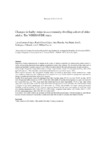Changes in frailty status in a community-dwelling cohort of older adults: the VERISAÚDE study

View/
Use this link to cite
http://hdl.handle.net/2183/21496
Except where otherwise noted, this item's license is described as Creative Commons Attribution-NonCommercial-NoDerivs 4.0 International License (CC-BY-NC-ND 4.0)
Collections
- Investigación (FCS) [1293]
Metadata
Show full item recordTitle
Changes in frailty status in a community-dwelling cohort of older adults: the VERISAÚDE studyAuthor(s)
Date
2018-11-15Citation
Lorenzo-López L, López-López R, Maseda A, Buján A, Rodríguez-Villamil JL, Millán-Calenti JC. Changes in frailty status in a community-dwelling cohort of older adults: the VERISAÚDE study. Maturitas. 2019;11:54-60
Abstract
[Abstract] Objectives: Greater understanding of changes in the degree of frailty is important for clarifying the natural history of frailty and may help clinical decision-making regarding preventive interventions. The objectives of this study were to explore natural frailty transition rates at 1-year follow-up and to identify the main determinants of such transitions.
Study design: Prospective longitudinal study covering a representative sample of community-dwelling older adults aged ≥65 years (n = 749) at baseline, and transition information at 1-year follow-up (n = 537).
Mean outcome measures: The assessment of frailty status was based on phenotypic criteria (unintentional weight loss, weakness, exhaustion, slow walking speed, low physical activity). Frailty transitions (progressed, regressed, no change, or death) and associated factors were assessed.
Results: Most participants remained unchanged from their baseline status (57.1% non-frail, 83.4% pre-frail, 66.7% frail). Regarding frailty transitions, 42.9% of non-frail older adults at baseline had progressed to a pre-frail status by the 1-year follow-up, and 7.9% of pre-frail older adults had become frail. Importantly, 33.3% of frail older adults regressed to a pre-frail status and 8.7% of pre-frail adults had regressed to a non-frail status. Non-frail females tended to progress to pre-frailty significantly more than males (p = 0.006), and mortality was higher among participants classified as frail at baseline (10.7%). Logistic regression showed that the main determinants of worsening frailty were hearing impairment (OR 3.180; 95% CI 1.078–9.384), congestive heart failure (OR 10.864; 95% CI 1.379–85.614), and polypharmacy (OR 2.572, 95% CI 1.096–6.037).
Conclusion: Our results confirm the dynamic of frailty and the bidirectional nature of frailty transitions, and indicate the need for preventing and treating these conditions in later life in order to minimize the burden of frailty.
Keywords
Frailty transitions
Pre-frailty
Older adults
Mortality
Hearing impairment
Pre-frailty
Older adults
Mortality
Hearing impairment
Editor version
Rights
Creative Commons Attribution-NonCommercial-NoDerivs 4.0 International License (CC-BY-NC-ND 4.0)
ISSN
0378-5122






